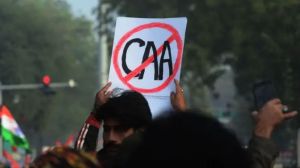Shoulder to shoulder with the US
As foreign ministers prepared to meet in Geneva to discuss the possibilities of a diplomatic end to the Iraq crisis, Britain took the unusu...

As foreign ministers prepared to meet in Geneva to discuss the possibilities of a diplomatic end to the Iraq crisis, Britain took the unusual step of releasing an intelligence assessment prepared for the Government on the threat from Iraq’s programme to build weapons of mass destruction. It said that as long as it had “the key components — and that is unclear — Iraq could build .. with little risk of detection missiles capable of hitting Israel and key targets in Saudi Arabia”.
It also said that if UNSCOM were to be withdrawn “or prevented from operating for a sustained period, Iraq could produce in a matter of months a small number of chemical and biological weapons….” The intelligence assessment stressed that if Iraq tried to produce chemical agents on a large scale this would not go undetected.
The current crisis erupted on October 29 when Iraq ordered the expulsion of Americans who were part of the UN weapon’s inspection team. The UN said it would not allow Iraq to dictate the make-up of its teams, and pulled out all its other inspectors. Doing otherwise would have isolated the US. Iraq took the “diplomatic initiative” and its foreign minister, Tariq Aziz, said it would be willing to allow US weapons inspectors back into the country as long as the inspection team reflected evenly the permanent composition of the Security Council.
Despite the Security Council’s decision last week, the consensus the US claims in support of its policy on Iraq does not exist.In the seven years since the Gulf War the Western consensus against Iraq has begun disintegrating and the US allies in the Arab world have also abandoned it.
Britian is the only Security Council member and indeed Western European country which, like the US, has not ruled out military action as an option in resolving the crisis and has contributed to last week’s military build-up in the Gulf. In fact, despite the supportive withdrawal of the entire UN team, the US and Britain were already fairly isolated, a fact that Saddam’s regime understands well and has exploited successfully. Iraq has referred to Britain as the US “stooge”, and when it comes to foreign policy in the East it gives all the impression of cohering rather closely to the US view.
Margaret Thatcher and then John Major stood shoulder to shoulder with George Bush when he declared war on Iraq five years ago, and did so with cross-party support in Parliament. While there were protests against the Gulf War, public opinion in Britain generally tends to support a government that takes a tough stand on Iraq. However, revelation of Britain’s involvement in building Iraq’s arms capability during the Iran-Iraq war has made people cautious. Britain suffered 17 casualties in the Gulf War, but the possibility of more war casualties could yet change public opinion. So far the only vocal opposition to Britain’s potential military involvement has come from Labour’s left-wing backbenchers who are seen as mavericks. In 1990, there were many more Labour politicians who joined the protests against the Gulf War, today some of them are in the Cabinet and bound to keep their opinions to themselves.
Like the US, Britain also supported Iraq through its eight-year war with Iran. Margaret Thatcher’s government broke its own regulations to allow British manufacturers to continue to supply Iraq with military technology despite a ban on arms sale to either regime while the war was still on. Even today Britain shares a very American dread for Iranian Islam, and sees Iraq as a balancing force in the region. Indeed Saddam Hussain’s survival after the Gulf War was a result of the US perception that Iran was a greater threat in the region and that Iraq should continue to act as a balancing force. A more controllable balancing force, since George Bush and the US administration were convinced that Saddam would never recover from the massive Gulf War defeat.
Oil, naturally, is a critical factor, in the balance of forces in the region. British and US interests in the region are driven by a concern for maintaining the security of oil producing countries, like Saudi Arabia, which are effectively on their side. The key targets in Saudi Arabia that face a threat from Iraq, would impact on the supply and price of oil. In fact, control over the region’s oil supplies is a major stumbling block in the quest for a consensus between the four permanent members of the Security Council. The view from Britain is that France and Russia are clearly set against military action, because they stand to gain tremendously from potential oil deals with Iraq.
A more complicated regional issue bound-up in this crisis is the Arab-Israeli conflict. The view is that US military action against Iraq would only strengthen Saddam and the anti-US feeling among Arabs. Even traditional allies, those who supported the US in the Gulf War, have maintained a distance from the US tough stand against Iraq. US policy towards Iraq reflects, they say, its pro-Israeli stand in the region: there is one law for Israel and another for Arab nations. While the US wants to target Iraq for obstructing UN work, Israel has continued to flout UN resolutions, derail the Middle-East peace process and build up an arsenal of non-conventional weapons. Popular opposition to the US is something that even Saudi Arabia, US’ strongest ally, may have to reflect.



- 01
- 02
- 03
- 04
- 05




























